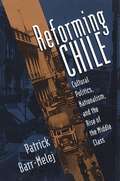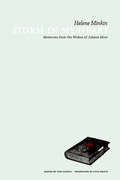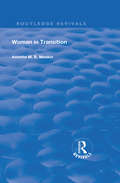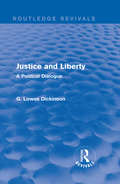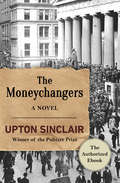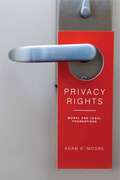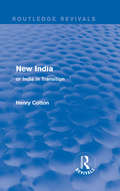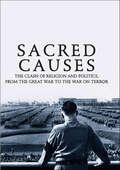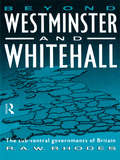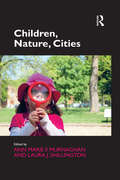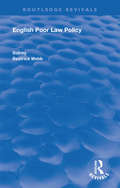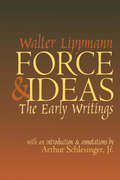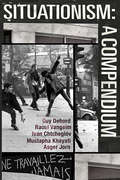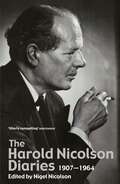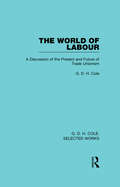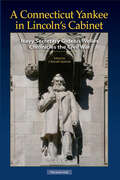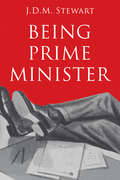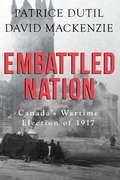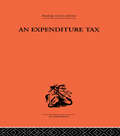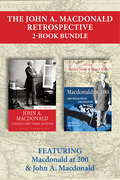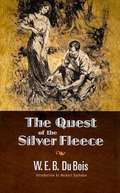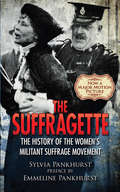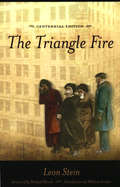- Table View
- List View
Reforming Chile
by Patrick M. Barr-MelejHighlighting the crucial yet largely overlooked role played by society's middle layers in the historical development of Latin America, Patrick Barr-Melej provides the first comprehensive analysis of the rise of Chile's middle-class reform movement and its profound impact on that country's cultural and political landscapes. He shows how a diverse collection of middle-class intellectuals, writers, politicians, educators, and bureaucrats forged a "progressive" nationalism and advanced an ambitious cultural-political project between the 1890s and 1940s. Together, reformers challenged the power of elite groups and sought to quell working-class revolutionary activism as they endeavored to democratize culture and fortify liberal democracy.Using sources that range from archival documents and newspapers to short stories, novels, and school textbooks, Barr-Melej examines the reform movement's cultural ideas and their political applications, especially as they were articulated in the areas of literature and public education. In the process, he provides a new framework for understanding Chile's cultural and political evolution, as well as the complicated place of the middle class in a society experiencing the swift changes inherent in capitalist modernization.
Storm in My Heart
by Helene MinkinPartner of one of the most infamous anarchists of her time, Johann Most, Helene Minkin joined the anarchist movement after emigrating from Russia in 1888 with her father and sister. Framed as a reaction and corrective to Emma Goldman's Living My Life, Minkin's memoir provides a unique account of turn-of-the-century anarchism and immigrant life in the United States. Published in the Yiddish-language newspaper Forverts in 1932, this is its first English translation. Tom Goyens teaches American history at Salisbury University in Maryland. He is the author of Beer and Revolution: The German Anarchist Movement in New York City, 1880–1914.
Woman in Transition (Routledge Revivals)
by Annette M. MeakinOriginally published in 1907. The woman movement is one of the greatest problems of our age, and those who travel with their eyes open known that it may be studied in every book and corner of our globe. This book contains chapters on girlhood in many lands, the young wife, thoughts on motherhood, and the eventuality of widowhood.
Justice and Liberty: A Political Dialogue (Routledge Revivals: Collected Works of G. Lowes Dickinson)
by G. Lowes DickinsonFirst published in 1908, this book takes the form of a discussion between Henry Martin- a professor, Charles Stuart- a banker, and Sir John Harington- a gentleman of leisure, on politics and civilisation. The speakers discuss many topics ranging from forms of society (such as oligarchy or democracy), to the institution of marriage, to the necessity of government.
The Moneychangers: A Novel
by Upton SinclairA financial thriller based on the Panic of 1907 by the Pulitzer Prize-winning author of The Jungle In 1907 the stock market crashed as a result of the manipulations of a group of powerful, wealthy, and unscrupulous men. The repercussions were felt across the nation, taking a devastating toll on thousands of small investors and hardworking Americans. The Moneychangers, written a century before the term "too big to fail" became part of the national lexicon, dramatizes the secret dealings of the one-percenters who brought the national economy to the brink of collapse. Lawyer Allan Montague is at home among New York City's wealthiest and most influential citizens. His position provides him with an insider's perspective on the motivations of the financial elite--and what he sees isn't always pretty. Now, a small group of very rich men intend to take down a rival, even if it means wiping out the livelihoods and savings of thousands and thousands of unsuspecting citizens in the process. Powerless to stop the plot, all Montague can do is try to save the woman he loves from a tragic collision of jealousy, avarice, and lust. This ebook has been authorized by the estate of Upton Sinclair.
Privacy Rights: Moral and Legal Foundations
by Adam D. MooreWe all know that Google stores huge amounts of information about everyone who uses its search tools, that Amazon can recommend new books to us based on our past purchases, and that the U.S. government engaged in many data-mining activities during the Bush administration to acquire information about us, including involving telecommunications companies in monitoring our phone calls (currently the subject of a bill in Congress). Control over access to our bodies and to special places, like our homes, has traditionally been the focus of concerns about privacy, but access to information about us is raising new challenges for those anxious to protect our privacy. In Privacy Rights, Adam Moore adds informational privacy to physical and spatial privacy as fundamental to developing a general theory of privacy that is well grounded morally and legally.
Routledge Revivals (1909): or India in Transition
by Henry CottonFirst published in 1909, the purpose of this book was to draw attention to the political, social and religious changes that were taking place in India and detail how this should inform British colonial policy. The author argues that the political situation demanded decisive action as several factors had caused increasing difficulties in administration: waning enthusiasm on the part of English officials, greater tension between the governors and the governed — often caused by colonial arrogance which had been brought into sharper relief by spread of education and the growth of patriotic feeling. He also argues that the crux of India’s economic difficulties was the poverty of its people and asserts that the solution to both problems was the ‘sympathetic and systematic encouragement of her legitimate aspirations and patriotic tendencies’. In regard to the social and religious changes, the author observes that the changes are not less considerable and advises that the government should, as far as was possible, maintain the existing basis by a policy of ‘wise conservation’. This book will be of interest to students of Indian history and colonialism.
Sacred Causes: The Clash of Religion and Politics, from the Great War to the War on Terror
by Michael BurleighBeginning with the chaotic post-World War I landscape, in which religious belief was one way of reordering a world knocked off its axis, Sacred Causes is a penetrating critique of how religion has often been camouflaged by politics. All the bloody regimes and movements of the twentieth century are masterfully captured here, from Stalin's Soviet Union, Hitler's Germany, Mussolini's Italy, and Franco's Spain through to the modern scourge of terrorism. Eloquently and persuasively combining an authoritative survey of history with a timely reminder of the dangers of radical secularism, Burleigh asks why no one foresaw the religious implications of massive Third World immigration, and he deftly investigates what are now driving calls for a civic religion to counter the terrorist threats that have so shocked the West.
Beyond Westminster & Whitehall: The Sub-central Governments Of Britain
by R. A. RhodesBeyond Westminster and Whitehall provides the first comprehensive account of the range of sub-central government institutions that are responsible for the delivery of services to citizens. These bodies are the warp and weft of the British system of government and yet are all too frequently ignored.For a full understanding of British government, the study of sub-central government is of equivalent importance to that of the Prime Minister, the Cabinet, and Parliament.Westminster and Whitehall do not always get what they want. There are a great many restraints upon the actions of the centre, and central policies all too often have unintended consequences. This book, demonstrating that Britain is not a unitary state but a differentiated polity in which sub-central governments play a key role, will be essential reading for teachers and students of British politics.
Children, Nature, Cities
by Ann Marie Murnaghan Laura J. ShillingtonWhy does the way we think about urban children and urban nature matter? This volume explores how dichotomies between nature/culture, rural/urban, and child/adult have structured our understandings about the place of children and nature in the city. By placing children and youth at the center of re-theorising the city as a socio-natural space, the book illustrates how children and youth's relations to and with nature can change adultist perspectives and help create more ecologically and socially just cities. As a key contribution to children's studies, the book engages and enlivens debates in urban political ecology and urban theory, which have not yet treated age as an important axis of difference. With examples from ten localities, the chapters in this volume ask how we can subvert both romanticized and modernist conceptualizations of nature and childhood that conflate innocence and purity with children and nature; the volume asks what happens when we re-invent urban natures with children's needs and perspectives in mind.
English Poor Law Policy (Routledge Revivals)
by Sidney Webb Beatrice WebbFirst published in 1910, this volume is a dispassionate analysis of the changes in and the various aspects of official policy towards pauperism from the ‘Revolution of 1834’ to the Majority and Minority Reports of 1909. In their preface to this volume the Webbs wrote: "What obscured the history was the manner in which masses of heterogeneous facts were heaped together. To read, one after another, these complicated Orders and lengthy Reports, each dealing with all kinds of paupers and various methods of relief, was but to accumulate confusion. They resembled a heap of geological conglomerates which could not be assayed until they had been broken up in such a way as to sort the different materials into separate homogeneous parcels". This book succeeds in presenting a masterly survey of this sector of the British social services on the eve of the foundation of the Welfare State, and completes the corpus of the Webbs on the Poor Law.
Force and Ideas: The Early Writings
by Walter LippmannThe acclaim for Lippmann the political thinker has at times obscured the equally impressive accomplishments of Lippmann the journalist. His output was prodigious, his influence on journalism significant. According to James Reston: "He has given a generation of newspapermen a wider vision of their duty." Early Writings provides a unique opportunity to rediscover this journalistic Lippmann and to observe the formative years of a brilliant mind.In 1913, just three years out of Harvard, Lippmann was asked by Herbert Croly to help plan and edit a new "weekly of ideas," the New Republic. Beginning with its first issue in 1914 and continuing through the following six years, Lippmann wrote numerous signed and unsigned articles. Here are the best of them, written during the exciting political era that began with the trauma of World War I and ended in the stasis of Republican Normalcy.Pulitzer Prize-winning historian, Arthur Schlesinger, Jr., places Lippmann in historical context while recreating the intellectual ambiance of the Wilsonian era. His annotations identify little-remembered personages and clarify issues that time has befogged. But in another sense, the issues and personages of 1910-1920 are only too familiar. Our world is still a world of war, ineffectual international political organizations, disappointed idealism, nerve-wracking platitudes, social unrest, and slinking politicians.
Situationism: A Compendium
by Guy Debord Ivan Chtcheglov Mustapha Khayati Raoul Vaneigem Asger JornAfter Guy Debord's seminal Society of the Spectacle, this new compendium brings together eight other important situationist works. Ivan Chtcheglov opens proceedings via his Formulary for a New Urbanism (1953), with it's quasi-mythical demand that resonated down through generations: "The hacienda must be built", followed by two brief but illuminating pieces from Asger Jorn, who's sandpaper book cover later turned up under the same Factory Records roof as Manchesters' own Hacienda, on the Durrtti Column's "Return of the Durrutti Column" ( the title itself lifted from Andre Bertrand's détourned pro-situ comic strip). Debord's The Decline and Fall of the Spectacle-Commodity Economy-was an immediate, razor sharp response to the LA/Watts Riots of 1965, it's analysis of the relationship between the rioter and the meaningless, unaffordable commodities they loot or destroy resonating heavily today. Tunisian situationist Mustapha Khayati contributes Address to Revolutionaries of Algeria and of All Countries and the game changing "On the Poverty of Student Life", the match that arguably lit the fires of May 68'. Raoul Vaneigem's The Revolution of Everyday Life finishes things off in defiant fashion : ". You're f*%@g Around With Us? -- Not For Long!"
The Harold Nicolson Diaries: 1907-1964
by Harold NicolsonOne of the great 20th century political diaries'Brilliant, riveting stuff' TRIBUNE'One stops to marvel at the achievement. Honesty, decency, modesty, magnanimity, are stamped on every page, as evident as the wit' EVENING STANDARD'A tremendous read' SPECTATORHarold Nicolson was one of the three great political diarists of the 20th century (along with Chips Channon and Alan Clark). Nicolson was an MP (Conservative, 1935-45, who also flirted with Labour after WWII). He had previously been in the Foreign Office and attended the Paris Peace Conference in 1919, and material from this period is included in this new edition for the first time. Nicolson never achieved high office, but rarely a day went by when he didn't record what was going on at Westminster. He socialised widely, was married to the poet and author Vita Sackville-West, and together they created the famous garden at Sissinghurst. Both were bi-sexuals and had affairs outside their marriage. This new edition also draws on diary entries and letters previously considered too sensitive for inclusion. The diversity of Harold Nicolson's interests and the irony in his writing make his diary a highly entertaining record of his life and times, as well as a document of great historical value.
The Harold Nicolson Diaries: 1907-1964
by Harold NicolsonOne of the great 20th century political diaries'Brilliant, riveting stuff' TRIBUNE'One stops to marvel at the achievement. Honesty, decency, modesty, magnanimity, are stamped on every page, as evident as the wit' EVENING STANDARD'A tremendous read' SPECTATORHarold Nicolson was one of the three great political diarists of the 20th century (along with Chips Channon and Alan Clark). Nicolson was an MP (Conservative, 1935-45, who also flirted with Labour after WWII). He had previously been in the Foreign Office and attended the Paris Peace Conference in 1919, and material from this period is included in this new edition for the first time. Nicolson never achieved high office, but rarely a day went by when he didn't record what was going on at Westminster. He socialised widely, was married to the poet and author Vita Sackville-West, and together they created the famous garden at Sissinghurst. Both were bi-sexuals and had affairs outside their marriage. This new edition also draws on diary entries and letters previously considered too sensitive for inclusion. The diversity of Harold Nicolson's interests and the irony in his writing make his diary a highly entertaining record of his life and times, as well as a document of great historical value.
The World of Labour: A Discussion Of The Present And Future Of Trade Unionism. 4th Ed. , With New Introd (Routledge Library Editions)
by G. D. ColeCole saw the trade unions as being critical to progress, but to realise their role they needed to change and the issue of trade union structure therefore became fundamental. He considered in this volume that trade union structure was a central problem of the labour movement - he described British trade unionism as a movement bereft of ideas and policy. He discusses the evolution in the trade unions to cover not only wages and working conditions but the organisation and control of industry.
A Connecticut Yankee in Lincoln's Cabinet: Navy Secretary Gideon Welles Chronicles the Civil War
by Gideon WellesThe U.S. Civil War through the eyes of a key member of President Abraham Lincoln’s cabinet.Gideon Welles, the Connecticut journalist-politician who served as Lincoln’s secretary of the navy, was not only an architect of Union victory but also a shrewd observer of people, issues, and events. Fortunately for posterity, he recorded many of his observations in his extensive diary. A Connecticut Yankee in Lincoln’s Cabinet brings together 250 of the most important and interesting excerpts from the diary, dealing with topics as varied as the issuance of the Emancipation Proclamation, the Marine Band’s concerts in Washington’s Lafayette Square, Lincoln’s sense of humor, rivalries among cabinet members, Welles’s often caustic opinions of prominent politicians and military leaders, demands for creation of a navy yard in his home state, the challenge of blockading 3,500 miles of Confederate coastline, the struggle against rebel commerce raiders, the battles of Antietam and Gettysburg, the Fort Pillow massacre of African American troops, and Lincoln’s assassination. Together, the excerpts provide a candid insider’s view of the Civil War as it unfolded, and an introduction provides the reader with context. Published by the Acorn Club.
Being Prime Minister
by J.D.M. StewartBehind the politics, discover the lives of Canada's leaders. “What a life it is to be prime minister!” — John Diefenbaker Canada has had twenty-three prime ministers, all with views and policies that have differed as widely as the ages in which they lived. But what were they like as people? Being Prime Minister takes you behind the scenes to tell the story of Canada’s leaders and the job they do as it has never been told before. From John A. Macdonald to Justin Trudeau, readers get a glimpse of the prime ministers as they travelled, dealt with invasions of privacy, met with celebrities, and managed the stress of the nation’s top job. Humorous and hard working, vain and vulnerable, Canada leaders are revealed as they truly were.
Embattled Nation: Canada's Wartime Election of 1917
by David Mackenzie Patrice DutilEmbattled Nation explores Canada’s tense wartime election of 1917. Amidst the drama of the First World War, Canada’s most divisive election ever raised pivotal questions about Canada’s place in the war and the world. This book examines the issues, people, and events behind one of the most important elections in Canada’s history.
Expenditure Tax (Modern Revivals In Economics Ser.)
by Nicholas Kaldor'This is one of those rare technical books which has an importance outside its own field' The Daily Telegraph.'One of the most stimulating post-war books on public finance' The Guardian.Part 1 examines the issue of Expenditure Tax in principle and includes chapters on the following:* Income, Expenditure and Taxable Capacity* The Concept of Income in Economic Theory* Taxation and Savings* Taxation and risk-bearing* Taxation and the Incentive to Work* Company Taxation* Taxation and Economic ProgressPart 2 examines the issue of Expenditure Tax in practice, asking whether personal expenditure tax is practicable and putting forward a proposal for Surtax Reform.
The Book of Songs: The Ancient Chinese Classic Of Poetry
by Arthur Waley The Arthur EstateFirst published in 1937. The Book of Songs is a collection of ancient Chinese songs, dating from 800 to 600 B.C. Until this was published in 1937 it had not been translated into English since the middle of nineteenth century, when sinology was still in its infancy. For the first time the original meaning of 290 out of the 305 songs is given, use being made of the advances in the study of old Chinese. The result is not merely a clear picture of early Chinese life, but also the restoration to its proper place in world literature of one of the finest collection of traditional songs.
The John A. Macdonald Retrospective 2-Book Bundle: Macdonald at 200 / John A. Macdonald
by Roger Hall Patrice Dutil Ged MartinThis special 2-book bundle contains a number of perspectives on a man who was arguably Canada’s most famous political leader, a figure of legendary proportions in the history of Canada’s birth and development. Ged Martin’s biography tells Macdonald’s story. Shocked by Canada’s 1837 rebellions, Macdonald sought to build alliances and avoid future conflicts. Thanks to financial worries and an alcohol problem, he almost quit politics in 1864. The challenge of building Confederation harnessed his skills, and in 1867 he became the country’s first prime minister. He drove the Dominion’s westward expansion, rapidly incorporating the Prairies and British Columbia before a railway contract scandal unseated him in 1873. He conquered his drinking problem and rebuilt the Conservative Party to regain power in 1878. The centrepiece of his protectionist National Policy was the transcontinental railway, but a western uprising in 1885 was followed by the controversial execution of rebel leader Louis Riel. Although dominant nationally, this popular hero had many flaws. Macdonald at 200 presents fifteen fresh interpretations of Canada’s founding prime minister, published for the occasion of the bicentennial of his birth in 1815. Crisply written by recognized scholars and specialists, the collection throws new light on Macdonald’s formative role in shaping government, promoting women’s rights, managing the nascent economy, supervising westward expansion, overseeing relations with Native peoples, and dealing with Fenian terrorism. A special section deals with how Macdonald has (or has not) been remembered by historians as well as the general public. The book concludes with an afterword by prominent Macdonald biographer Richard Gwyn. Macdonald emerges as a man of full dimensions — an historical figure that is surprisingly relevant to our own times. Includes John A. Macdonald Macdonald at 200
The Quest of the Silver Fleece
by W. E. B. Du BoisSet in Alabama and Washington, D.C., in the early part of the twentieth century, W. E. B. Du Bois's first novel weaves the themes of racial equality and understanding through the stark reality of prejudice and bias. Du Bois addresses the fact that, despite the legal emancipation of African Americans, the instruments of oppression, in both the economy and government, remained in good working order. At the time he was writing, powerful white industrialists controlled the cotton industry, the "silver fleece" that depended, as it did during slavery, on the physical labor of African Americans.
The Suffragette: The History of the Women's Militant Suffrage Movement
by Sylvia Pankhurst Emmeline PankhurstBy 1903, more than fifty years of peaceful campaigning had brought British women no closer to attaining the right to vote. In that year activist Emmeline Pankhurst founded the Women's Social and Political Union, a militant organization dedicated to achieving women's suffrage. The union's motto, "Deeds not words," reflected its radical approach, consisting of stone-throwing, window-breaking, arson, and physical confrontation with authorities.The Suffragette, written by Emmeline Pankhurst's daughter, Sylvia, offers an insider's perspective on the union's growth and development as well as the motives and ideals that inspired its leaders and followers. She chronicles the protesters' tactics as well as the consequences of their actions: arrests, imprisonment, hunger strikes, and the mental and physical ordeals of forced feeding. Vintage photographs illustrate the demonstrations, courtroom trials, and other dramatic incidents from the history of the women's militant suffrage movement.
The Triangle Fire
by Leon SteinOn March 25, 1911, 146 employees of the Triangle Shirtwaist Company in New York City were killed in the span of a few minutes because no provision had been made for their safety in the event of fire. The Cornell edition of Leon Stein's 1962 account features 16 illustrations, some never before published. A new introduction by the journalist William Greider makes clear that accounts of dangerous workplaces and sweatshop conditions are still all-too-relevant today, ninety years after the fire. The story of the catastrophe and the doomed Triangle Shirtwaist workers, as told by one of the great labor journalists, will not soon be forgotten. Praise for the 1962 edition- "Stein . . . recreate[s] the tragic events of the fire in all their dramatic intensity. His moving account is a work of dedication. "-New York Times Book Review "With commendable restraint, [Stein] uses newspapers, official documents, and the evidence of survivors to unfold a story made more harrowing by the unemotional simplicity of its narration. "-Library Journal "Stein . . . suggests that the fire alerted the public to shocking working conditions all over the city and helped the unions organize the clothing industry, but his good taste keeps him from selling the reader any silver lining. A by-product of the careful research that has gone into this excellent narrative is an interesting sketch of the hard lives and times of working girls in the days when the business of America was business. "-New Yorker
